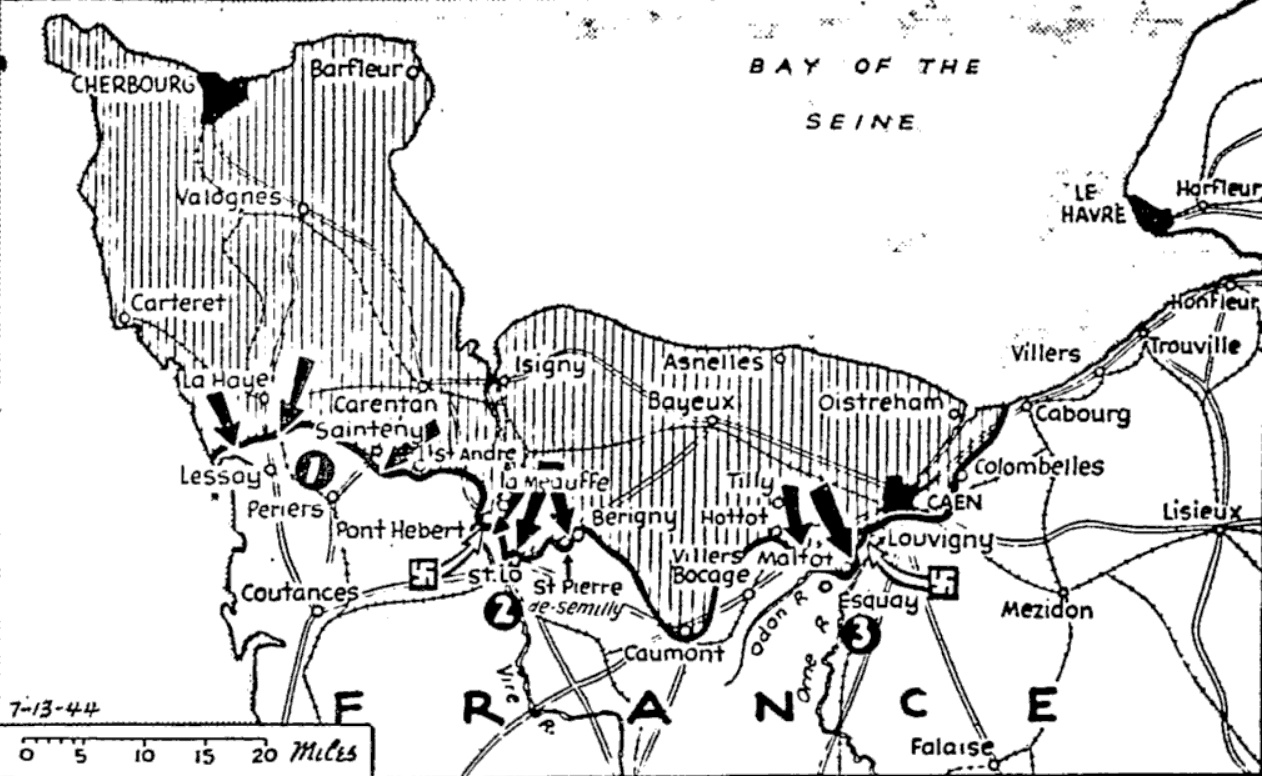
Roving Reporter
By Ernie Pyle
In Normandy, France – (by wireless)
This war in Normandy is a war from hedgerow to hedgerow, and when we get into a town or city, it is a war from street to street.
The other day I went along, quite accidentally, I assure you – with an infantry company that had been assigned to clean out a pocket in the suburbs of a city.
Since this episode was typical of the way an infantry company advances into a city held by the enemy, I would like to try to give you a picture of it. I can’t do it in just one column, so you’ll have to read this in instalments covering several days. I hope your patience holds out.
As I say, I hadn’t intended to do it. I started out in the normal fashion that afternoon to go up to a battalion command post and just look around. I was traveling with correspondent Charles Wertenbaker and photographer Bob Capa, both of TIME and LIFE magazines.
Well, when we got to the CP, we were practically at the frontlines. The post was in a church that stood on a narrow street. In the courtyard across the street, MPs were frisking freshly taken prisoners.
Russians have wives with ‘em
I mingled among the prisoners awhile. They were still holding their hands high in the air, and you’re pretty close in the front when prisoners do that. They were obviously frightened and eager to please their captors. A soldier standing beside me asked one German kid about the insignia on his cap, so the kid gave the insignia to him.
The prisoners had a rank odor about them, like silage. Some of them were Russians, and two of these had their wives with them. They had been living together right at the front. The women thought we were going to shoot their husbands and they were frantic.
That’s one way the Germans keep these conscripted Russians fighting – they have thoroughly sold them on the belief that we will shoot them as soon as they are captured.
Below us there were big fires in the city, and piles of black smoke. Explosions were going on all around us. Our own big shells would rustle over our heads and explode on beyond with a crash. German 200mm shells would spray over our heads and hit somewhere in the town behind us. Single rifle shots and machine-pistol blurps were constant. The whole thing made you feel tense and jumpy. The nearest Germans were only 200 yards away.
We were just hanging around absorbing all this stuff when a young lieutenant, in a trench coat and wearing sunglasses – although the day was miserably dark and chill – came up and said:
Our company is starting in a few minutes to go up this road and clean out a strongpoint. It’s about half a mile from here. There are probably snipers in some of the houses along the way. Do you want to go along with us?
Ernie accepts and starts walking
I certainly didn’t. Going into battle with an infantry company is not the way to live to a ripe old age. But when you are invited, what can you do?
So I said, “Sure.” And so did Wertenbaker and Capa. Wert never seems nervous, and Capa is notorious for his daring. Fine company for me to be keeping.
We started walking. Soldiers of the company were already strung out on both sides of the road ahead of us, just lying and waiting till their officers came along and said so.
We walked until we were at the head of the column. As we walked, the young officer introduced himself. He was Lt. Orion Shockley of Jefferson City, Missouri. I asked him how he got the odd name Orion. He said he was named after Mark Twain’s brother.
Shockley was executive officer of the company. The company commander was Lt. Lawrence McLaughlin from Boston. One of the company officers was a replacement who had arrived just three hours previously and had never been in battle before. I noticed that he ducked sometimes at our own shells, but he was trying his best to seem calm.
The soldiers around us had a two-week growth of beard. Their clothes were worn slick and very dirty. They still wore the uncomfortable gas-impregnated clothes they had come ashore in.
The boys were tired. They had been fighting and moving constantly forward on foot for nearly three weeks without rest – sleeping on the ground, wet most of the time., always tense, eating cold rations, seeing their friends die.
One came up to me and said, almost belligerently:
Why don’t you tell the folks back home what this is like? All they hear about is victories and lots of glory stuff. They don’t know that for every hundred yards we advance somebody gets killed. Why don’t you tell them how tough this life is?
Exhaustion makes ‘em that way
I told him that was what I tried to do all the time. This fellow was pretty fed up with it all. He said he didn’t see why his outfit wasn’t sent home, that they had done all the fighting.
That wasn’t true at all, for we have other divisions that have fought more and taken heavier casualties than this one. Exhaustion will make a man feel like that. A few days’ rest usually has him smiling again.
As we waited to start our advance, the low black skies of Normandy let loose on us and we gradually became hopelessly soaked to the skin.
